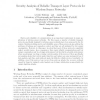Free Online Productivity Tools
i2Speak
i2Symbol
i2OCR
iTex2Img
iWeb2Print
iWeb2Shot
i2Type
iPdf2Split
iPdf2Merge
i2Bopomofo
i2Arabic
i2Style
i2Image
i2PDF
iLatex2Rtf
Sci2ools
115
click to vote
PERCOM
2010
ACM
2010
ACM
Security analysis of reliable transport layer protocols for wireless sensor networks
End-to-end reliability of communications is an important requirement in many applications of wireless sensor networks. For this reason, a number of reliable transport protocols specifically designed for wireless sensor networks have been proposed in the literature. Besides providing end-to-end reliability, some of those protocols also address the problems of fairness and congestion control, and they are all optimized for low energy consumption. However, in this paper, we show that most of those protocols completely neglect security issues. As a consequence, they ensure reliable communications and low energy consumption only in a benign environment, but they fail in a hostile environment, where an adversary can forge or replay control packets of the protocol. More specifically, our analysis shows that control packet injection and replay can cause permanent loss of data packets, and thus, such misdeeds make the hitherto reliable protocol unreliable. In addition, even if the protocol c...
Computer Networks | Control Packets | Low Energy Consumption | PERCOM 2010 | Wireless Sensor Networks |
Related Content
| Added | 29 Jan 2011 |
| Updated | 29 Jan 2011 |
| Type | Journal |
| Year | 2010 |
| Where | PERCOM |
| Authors | Levente Buttyán, L. Csik |
Comments (0)

